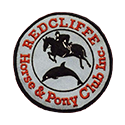How does pony club work?
Pony Club is a volunteer organisation run to help kids (big and small) learn to ride and be able to enjoy their horses. All our instructors are volunteers, and having parents and members help set up for musters, run the canteen and take care of all the running of our competition days helps keep our fees reasonable. You don’t need any experience to help out at pony club. Assistance is always appreciated helping with the canteen, or setting up and packing away gear for musters and events.
Redcliffe Horse & Pony Club PIC
The PIC for the Redcliffe Horse & Pony Club Grounds is QIRC0016.
Please remember to record this on your Horse Movement Records.
Do I need my own horse for pony club?
Yes, you will need to buy or lease your own horse and bring it to pony club if you want to ride.
Is pony club just for kids?
No, we have big kids as well as little kids at Redcliffe Horse & Pony Club. All experience levels are welcome.
There are competitions for all age groups, from under 6’s to Seniors (26 years and over). It is a club requirement that you and/or your parents help out setting up and packing up after musters, and on competition days.
How much does pony club cost?
Please refer to the Membership page.
Biosecurity Fact Sheet
We take biosecurity seriously and have measures in place to mitigate the risk of infections, diseases and pests.
OUR BIOSECUIRTY POLICY
All horse owner’s and competitors should be aware that you have a biosecurity obligation to take all reasonable steps to ensure your activities do not spread a pest, disease, or comtaminant.
Competitors are asked to ensure good biosecurity practices at home and at the event and to follow the instructions of the Organising Committee and the Biosecurity Manager or risk expulsion form the event.
All horses entering the grounds must be from a property actively practicing good biosecurity principles within their management.
Horse Health Declarations (HHD) are a mandatory requirement for all events. Please read HHD and ensure:
*Your horses are shampooed, rinsed and allowed to dry, and their hooves are picked clean of all solid material and washed with shampoo.
*Your vehicles and equipment accompanying the horses are cleaned to remove all solid materials that could contain disease agents, and then disinfected.
Acceptance into the event will be refused if the required HHD is not presented at point of entry or designated registration point, as advised by the Organising Committee.
The Property Identification Code (PIC) of the horse’s origin must be included in the HHD.
Other Biosecurity and workplace health and safety measures that aim to provide the safest environment for horses, competitiors, volunteers and visitors include:
*No horses with signs of illness are to be brought on to the grounds.
*No communal water troughs are available at this event.
*Do not feed horses on the ground.
*Do not share equipment, including food and water containers, between horses.
*Competitors are responsible for cleaning up manure from yards and placing it in designated areas / or spreading it on the grass. Please use your own rakes and shovels.
*Competitors are required to advise the event organisers immediately if a horse is sick. Stop all non-essential contact with a sick horse. Do not allow children to have close contact with a sick horse.
*Everyone handling horses should wash or sanitise hands between contacting different horses.
Our BIOSECURITY PLAN is a set of preventative control measures and actions aimed at reducing the risk of infectious diseases and pests on and off the venue, and between horses at the venue.
WHAT TO EXPECT IN THE UNLIKELY EVENT OF A BIOSECURITY INCIDENT:
In the unlikely event of a biosecurity incident, the Biosecurity Manager and the Organising Committee will implement our Event Biosecurity Plan.
You will be notified about the incident and expected to follow the directions given by the Organising Committee.
Everyone will be expected to remain at the venue until cleared by the Organising Committee and Biosecurity Manager.
In the event of horse movement restrictions, participants are responsible for the care, maintenance and cost of the horse and themselves, including feeding, bedding, vets and personal needs.
If a horse is confirmed to have an infectious disease, the owner / lessee will be responsible for all vet costs, and if the venue is locked down and quarantined, will be responsible for all costs associated with this.
Where can I download a horse health declaration form?
Here is a downloadable copy of the required Horse Health Declaration Form – simply click this link
